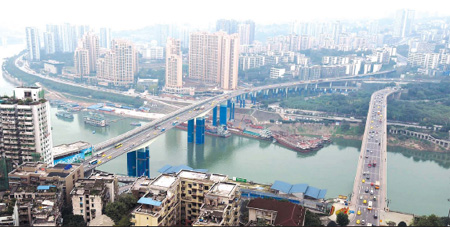Inland interchange
Updated: 2011-02-18 14:17
By Meng Jing (China Daily European Weekly)
|
 Chongqing is poised to become one of the fastest-growing cities in the world as it sits in one of the most important new regions in China, and offers an alternative to coastal megacities. [Zhou Hengyi/Xinhua]
|
Chongqing municipality bets on its position as a hub for the country's west
In September 2007, two ambitious business graduates from Grant MacEwan University flew from Canada to China to look for work. Adam McWhirter went to Chongqing, a mountainous city in Southwest China, while his classmate chose Beijing, the capital of the world's leading emerging economy. McWhirter is now a well-connected Chongqing representative of the European Union Chamber of Commerce in China (EUCCC). The managing partner of Maxxelli Real Estate is also running a multi-million yuan company in the inland city. His former classmate is still teaching English in Beijing.
"I came here for the opportunities and the opportunities in Chongqing never end," McWhirter says.
For him, what can be done in first-tier cities such as Beijing, Shanghai, Shenzhen and Guangzhou, have already been done.
"No matter what you do, as long as you are ambitious, you can take off in Chongqing. Because things are changing so fast here," he says.
|
|
Chongqing will be one of the world's fastest-growing cities this decade as it sits in one of the country's most important new regions, interior China, and offers a healthy alternative to coastal megacities, which suffer from rising costs and labor shortages, according to a Forbes forecast in October 2010.
As the only municipality in western China, Chongqing, with a population of 32 million and a size similar to Austria, has attracted increasing interests from international investors. Figures from the EUCCC show that their members in Chongqing and neighboring Chengdu, capital of Sichuan province, have grown from 85 to about 120 in 2010, after witnessing similar growth the previous year.
Shikha Tiwari, director of UK trade and investment in Chongqing, has also seen an increasing number of British investors coming to the city in the past two years.
"Around 35 to 40 British companies have opened their branches in Chongqing, including eight major ones which established their business in the past two years," she says, adding that the total value of British investment in Chongqing is about 2 billion yuan (223 million euros).
"A lot of companies have moved to the west due to the rising cost of doing business in costal cities such as Shanghai, Guangzhou and Shenzhen. More British companies are becoming aware of the opportunities Chongqing has to offer. They know that the earlier they get here, the less competition they will have to face," Tiwari says.
For many years, coastal cities enjoyed an advantage in drawing investment and outsourcing orders due to their proximity to overseas markets. But as the cost of labor and raw material continues to rise, the inland municipality of Chongqing has emerged as the next destination for manufacturing and outsourcing, out of which notebook PC manufacturing has grabbed the most attention.
Chongqing mayor Huang Qifan has long dreamed of building the city into the largest PC manufacturer in Asia with an annual production capacity of 100 million units by the end of 2015, after realizing that the city's long-established automobile and motorcycle manufacturing industry will not offer enough support to maintain rapid increase in the city's economic growth.
Despite being far from well-developed coastal cities, the inland city's annual GDP growth has exceeded 14 percent on average in the past five years, surpassing the overall rise in China, which is about 11 percent.
"Chongqing is entering a new phase of economic development which requires an upgrade in its industry structures," says Mu Huaping, director of the Chongqing Economic and Information Technology Commission.
About 40 percent of Chongqing's total industrial output value is generated from the automobile and motorcycle manufacturing industry, he says.
"And a booming economy cannot rely on one solo industry, which is too dangerous for the development of a city from a long-term view," he says.
Compared with its coastal counterparts, Chongqing's cost of labor as well as water, electricity and natural gas is nearly 30 percent lower.
Moreover, western China has a larger working population to draw from, compared with those of provinces in the east and south. The neighboring six provinces of Chongqing, with a population of 300 million, are home to many migrant workers in China.
The central government also offers a 10 percent tax reduction for companies operating in certain western areas.
Chongqing's advantages have lured many big names in the IT industry. Hewlett-Packard (HP) and Acer, the world's largest and second-largest PC producers, have moved their operations to Chongqing or announced plans to build a manufacturing center in the city.
E-paper

Ear We Go
China and the world set to embrace the merciful, peaceful year of rabbit
Preview of the coming issue
Carrefour finds the going tough in China
Maid to Order
Specials

Mysteries written in blood
Historical records and Caucasian features of locals suggest link with Roman Empire.

Winning Charm
Coastal Yantai banks on little things that matter to grow

New rules to hit property market
The State Council launched a new round of measures to rein in property prices.

